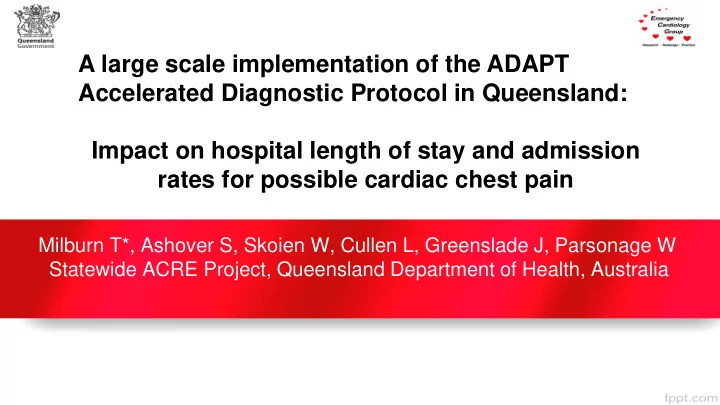

A large scale implementation of the ADAPT Accelerated Diagnostic Protocol in Queensland: Impact on hospital length of stay and admission rates for possible cardiac chest pain Milburn T*, Ashover S, Skoien W, Cullen L, Greenslade J, Parsonage W Statewide ACRE Project, Queensland Department of Health, Australia
Faculty Disclosure • The presenter has advised that the following presentation will NOT include discussion on any commercial products or service and that there are NO financial interests or relationships with any of the Commercial Supporters of this years ASM.
Background • Chest pain is one of the most common primary presentations to Australian Emergency Department's (ED’s) • AIHW Emergency Department Care, 2014 – 15, Australian Hospital Statistics 1 show 251 537 patients presented to ED’s with ‘pain in throat and chest’ • Potential for serious pathology – most notably Acute Coronary Syndromes (ACS) • 2006 NHF / CSANZ guidelines 2 describe the risk stratification of patients to low, intermediate and high risk. 1. Australian Institute of Health and Welfare 2015. Emergency department care 2014-15: Australian hospital statistics. Health services series no. 65 Cat. No. HSE 168. Canberra: AIHW 2. Acute Coronary Syndrome Guidelines. Working Group. National Heart Foundation of Australia, Cardiac Society of Australia and New Zealand guidelines for the management of acute coronary syndromes 2006. Med J Aust 2006; 184 (8 Suppl): S1-S32
Cullen L, et al. Costs and outcomes of assessing patients with chest pain in an Australian emergency department. MJA 2015; 202 (8): 427-433
NHF / CSANZ risk stratification
ADAPT Accelerated Diagnostic Protocol (ADP) – Thrombolysis In Myocardial Infarction (TIMI) score = 0 at presentation – No new ischemic changes on electrocardiograph at 0 and +2 hours – cTnI level at 0 hour and +2 hours below institutional cutoff for an elevated troponin concentration Than M, et al S. 2-Hour accelerated diagnostic protocol to assess patients with chest pain symptoms using contemporary troponins as the only biomarker: the ADAPT trial. J Am Coll Cardiol 2012; 59: 2091-2098
Drivers for change….. • Increasing pressure on ED’s. 2012: National Health Reform Agreement – Funding targets linked to the 4 hour National Emergency Access Target (NEAT) • Innovation funding 2013: The Queensland Department of Health - Health Innovation Fund (HIF) – Innovative solutions with the potential for statewide application – Four priority funding areas including reducing waiting times for EDs.
Accelerated Chest pain Risk Evaluation (ACRE) Project • Purpose: – To measure the effect of the ADAPT ADP on 1. ED Length of stay (LOS) 2. Total hospital (LOS) 3. Admission rates
Accelerated Chest pain Risk Evaluation (ACRE) Project • Method: – Centrally-based ACRE project team – QH Hospitals selected based on access to laboratory pathology – Engagement of key stakeholders and hospital executives – Face to face meetings – Close collaboration of ACRE project team and hospitals – Analysis and feedback
Accelerated Chest pain Risk Evaluation (ACRE) Project • Data: – 12 months pre-implementation data collected from the Emergency Department Information System (EDIS) – Post-implementation data identified ADP-suitable patients with EDIS project box – Linked to inpatient records where relevant – 16 eligible QH hospitals between October 2013 and August 2015
Results TOTAL PATIENTS Pre implementation: 32 066 Post implementation: 33 017 Possible Cardiac Chest Pain: 25 023 Managed on ADP: 5 815 23.2% managed on ADP (95% CI: 22.7 – 23.8%)
Results Median Total Hospital LOS 1210 (IQR: 511 – 3494) Pre implementation: 806 (IQR: 368 – 2300) Post implementation: Decrease of 404 min (95% CI: 370 – 437)
Results ED LOS 230 mins (IQR: 163 – 352) Pre implementation: Post implementation: 213 mins (IQR: 150 – 307) Decrease of 17 mins
Results Hospital Admissions Pre implementation: 70.4% Post implementation: 57.3% Absolute decrease = 13.1% (95% CI: 12.3 – 13.9%)
Conclusion Small local gains = Significant rewards collectively
Conclusion Success factors for large scale clinical redesign: 1. Key stakeholder engagement 2. Strong evidence base from locally derived research 3. Clinician-led change 4. Adaptability of pathway to fit local processes 5. Continual feedback and communication
Recommend
More recommend